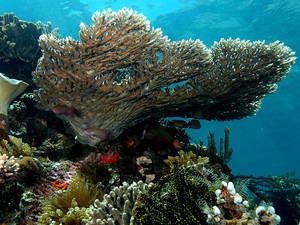Corals can adapt to tolerate higher ocean temperatures that could accompany climate change, scientists have shown.
It's been known for over a decade that warmer waters cause corals to undergo "bleaching", during  which they expel the photosynthetic algal passengers that normally capture sunlight and provide energy for them. This compromises the coral, which sometimes never recovers, leading to concern that rising global sea temperatures could herald the end of reef ecosystems worldwide.
which they expel the photosynthetic algal passengers that normally capture sunlight and provide energy for them. This compromises the coral, which sometimes never recovers, leading to concern that rising global sea temperatures could herald the end of reef ecosystems worldwide.
But on Ofu Island, in American Samoa, there are coral-rich pools of water left isolated by the ebbing tide. Warmed by the Sun, the water in these so-called "highly variable" pools can routinely reach 35 degrees Celsius, a temperature way above that normally associated with coral bleaching. Meanwhile, other less isolated pools nearby experience much smaller temperature swings and reach a maximum of 32 degrees Celsius.
Since corals of the same species can be found flourishing in both, Stanford scientist Stephen Palumbi and his colleagues were able to do a natural experiment to understand why the corals inhabiting the hotter, highly variable pools can tolerate conditions that would routinely "bleach" corals elsewhere.
Using samples of the bleaching-prone table top coral Acropora hyacinthus, which is common across the Pacific, the team compared the gene expression profile and the presence of photosynthetic algae between the corals when growing samples of the corals were transplanted between the two pool types.
Over a 1-2 year period, corals naturally growing in the hotter environment, they found, lost their heat-tolerance when they were moved to the cooler pools, while corals native to the cooler pools became much more resilient to the harsh conditions of their new home.
This was reflected in a change in the pattern of genes turned on in the corals. Surprisingly, however, the acclimatisation did not involve a substantial change to the photosynthetic algal species carried by the corals.
These results, say the researchers, "clearly show that acclimatisation can allow corals to acquire significant high temperature resistance more quickly than natural selection [meaning evolution] would produce."
However, the team caution in their paper in Science that "we do not yet know how many coral species can acclimate or evolve."
They also question whether there is an upper limit of temperature for this acclimatisation process, and point out that corals are currently threatened by more than just high temperatures. Pollution and ocean acidification are also major players which could jeopardise the abilities of corals to adapt...










Comments
Add a comment